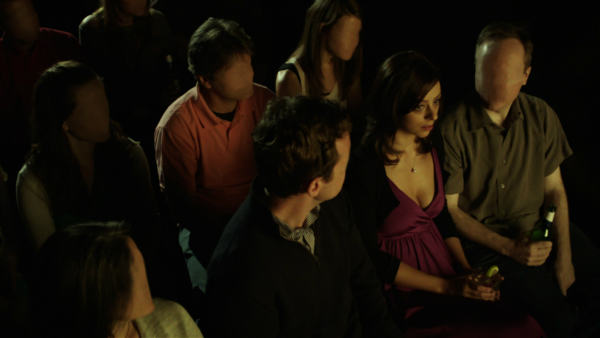
This is a guest post by Rebecca De Ornelas and Michael DiBiasio.
Rebecca On The Challenges of Equal Representation
Acting, from the point of view of trying to get work, is difficult in and of itself. Every role has a fit, and it often comes down to a numbers game to begin booking roles at all – never mind parts that reflect a healthy and multicultural representation of women as we are in the real world.
Many characters I’ve auditioned for over the past several years may or may not have had a name, but in the breakdown they’re often qualified as “The Best Friend,” “The Loyal Wife,” “A Hooker.” Far too many are written in service to a male lead or are female leads solely looking for a man. When you add the fact that I’m part Hispanic, there’s a whole other slew of stereotypes to contend with. You don’t know how many times I have been asked to “Do it again, like Rosie Perez.”
So where are the meaty roles? What do you do when the women you’re asked to play aren’t really women at all, but stereotypes borne out of a writer or producer’s dream of what a woman is supposed to be (or what he thinks she represents to him)?
The answer is: make your own work. Change doesn’t come from trying to twist pre-existing notions. It’s borne from within and then you act on it.
Michael On His Journey to Writing Better Female Characters
To be completely honest, when I first started writing, and for a while after, it was from a decently misogynistic point of view. I don’t completely blame myself for this, but I think it’s important to discuss the point because I’m an example of how things can change for the better. In the years leading up to meeting Rebecca, I had already shifted my perspective substantially. A few friends, male and female, had been calling me out on various forms of sexism that had carried over from growing up in a more traditional environment. But it wasn’t until I met Rebecca that I really began the journey towards becoming a better man.
I don’t think it’s a coincidence that my work also improved, not only in terms of perspective but also of quality.
The dirty secret of ignorance is that, when you’re someone espousing an unjust point of view, you always know that you’re hiding from the truth. Too often, many men make the wrong choice when this knowledge is forced to the surface. We get afraid, and when we’re afraid, we get defensive.
This, more than anything, is what’s holding our society back from more equal gender representation in film and TV. Yes, the first thing we need is more statistically equal representation among writers, directors, producers, actors, and so on, not only in terms of gender but also race. But the second thing we need, is more men (especially those with the power to enact true change) to admit and address the fact that the America we most often see on our screens does not represent what the country actually looks like.

Speaking to Rebecca’s point, we’re making The Videoblogs for a lot of reasons. I spent most of the past two years on my website sourcing these reasons out. Essentially we’re seeking to participate in change. With this project, that means doing what we can to contribute to a greater dialogue on mental health with a film that features a non-stereotypical cast.
Most of the characters in the film (particularly the three central characters) are women, and characters vary by race such that they hopefully represent actual Brooklyn. The relationships between men and women in the film are based on everyday interaction rather than only on flirtation and sex.
As Rebecca notes, more than anything else we’re looking to “be the change.” Advocacy like what gets discussed here on Bitch Flicks does a world of good. As artists and filmmakers, though, it’s also up to us to challenge the status quo and force the rest of the world to follow suit by supporting that change.
Rebecca De Ornelas (Actor/Producer) was born and raised in Brooklyn, New York. In addition to The Videoblogs, she is also currently working on OnTheRoad Rep’s production of George Kelly’s The Show-Off. For more on Rebecca, please visit her site: www.rebeccadeornelas.com.
Michael DiBiasio (Writer/Director) is currently in preproduction on his first feature film, The Videoblogs. To learn more about his work, or to watch his new short Multiverse (produced with Rebecca), please visit www.mdibiasio.com.


